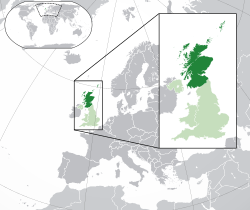"So͘-kat-lân" pán-pún chi-kan bô-kāng--ê tē-hng
無編輯摘要 |
無編輯摘要 piau-chhiam: Ēng hêng-tōng pian-chi̍p tī chhiú-ki-á bāng-ia̍h kái--ê |
||
| Tē 22 chōa: | Tē 22 chōa: | ||
|leader_name2 = |
|leader_name2 = |
||
}} |
}} |
||
'''So͘-kat-lân''' ([[Eng-gí]]: ''Scotland'' "{{adapt|Su-kot-làn}}"; [[So͘- |
'''So͘-kat-lân''' ([[Eng-gí]]: ''Scotland'' "{{adapt|Su-kot-làn}}"; [[So͘-kat-lân Gael-gí]]: ''Alba''), sī tī [[Britain]]-tó pak-pêng ê thó͘-tē, sī cho͘-ha̍p chò [[Liân-ha̍p Ông-kok]] 4 ê [[kok-ka]] (''country'') ê 1 ê. |
||
== Hō-miâ == |
== Hō-miâ == |
||
2019-nî 10-goe̍h 14-ji̍t (pài-it) 02:43 ê siu-tēng-pún
Scotland Alba So͘-kat-lân | |
|---|---|
|
kî-á | |
 | |
| Tē-ūi | Liân-ha̍p Ông-kok ê cho͘-sêng pang-kok |
So͘-kat-lân (Eng-gí: Scotland "Óa-im: "su-kot-làn""; So͘-kat-lân Gael-gí: Alba), sī tī Britain-tó pak-pêng ê thó͘-tē, sī cho͘-ha̍p chò Liân-ha̍p Ông-kok 4 ê kok-ka (country) ê 1 ê.
Hō-miâ
Eng-gí-miâ Scotland lâi-goân sī Scoti, sī Latin-gí tùi Gael lâng ê kiò-hoat. Kâng gí-goân ê tē-hō-miâ Scotia, tāi-seng sī chí kin-á-ji̍t ê Ài-ní-lân. Kàu siōng-bô 11 sè-kí ê sî, Scotia khai-sí hông ēng lâi chí ēng Gael-hē giân-gí ê So͘-kat-lân Forth Khe í pak tē-hng; tông-sî ia̍h ū chi̍t jī tùi Gael-gí Alba piàn--lâi ê Albania kap Albany. Tāi-khài tī Āu-kî Tiong-sè-kí ê sî-chūn, Scots kap Scotland chiah khah phó͘-phiàn hông ēng lâi hō kin-á-ji̍t ê So͘-kat-lân jîn-bîn kap tē-hng.
Tī Bân-lâm-gí, Scotland ê im-e̍k-gí ū So͘-kat-lân[1], So͘-kiat-lân[2], So͘-kek-lân[3] ia̍h Su-kat-lân[4] téng khoán.
Jîn-kháu
Giân-gí
So͘-kat-lân ū 3 khoán koan-hong sêng-jīn giân-gí: Eng-gí, So͘-kat-lân-gí, kap So͘-kat-lân Gael-gí.[5][6] So͘-kat-lân Piau-chún Eng-gí (Scottish Standard English) sī So͘-kat-lân só͘ thong-hêng ê chi̍t khoán Eng-gí piàn-chéng.[7] Kun-kù 2011 nî phó͘-cha, 63% ê So͘-kat-lân jîn-kháu sī bē-hiáu So͘-kat-lân-gí--ê.[8] Lēng-gōa tī So͘-kat-lân ia̍h ū chi̍t khoán Koân-tē Eng-gí (Highland English). Nā Gael-gí hong-bīn, chú-iàu sī ùi Se-hng Kûn-tó (Western Isles) teh kóng.[9] Gael-gí ê sú-iōng jîn-kháu, tī 1881 nî ū 250,000 lâng, kàu 2008 nî í-keng chhun 60,000 lâng chó-iū.[10]
Tē-lí
Chèng-tī
- Chhoā-thâu ê pō͘-tiúⁿ: Alex Salmond
Chham-khó
- ↑ "Cha̍p-jī goe̍h 27 hō, kū-le̍k 11 goe̍h 12 ji̍t, An I-seng-niû tī So͘-kat-lân kòe-óng". Tâi-lâm Kàu-hōe-pò (264). 1907 nî 3 goe̍h.
- ↑ "Pa Bo̍k-su-niû Ê Sió-toān". Tâi-lâm Kàu-hōe-pò. 1909 nî 10 goe̍h.
- ↑ John Macgowan (1883). "Scotland". English and Chinese dictionary of the Amoy dialect.
- ↑ Siù-chú Iâ-so͘ Ki-tok kâi Sin-ieh Tshuân-tsṳ. 1892. (Sòaⁿ-thâu-ōe)
- ↑ Gaelic Language Plan, www.gov.scot. Retrieved 2 October 2014.
- ↑ Scots Language Policy, www.gov.scot. Retrieved 2 October 2014.
- ↑ Stuart-Smith J. Scottish English: Phonology in Varieties of English: The British Isles, Kortman & Upton (Eds), Mouton de Gruyter, New York 2008. p.47
- ↑ "Scotland's Census 2011". National Records of Scotland. 27 May 2014 khòaⁿ--ê.
- ↑ Kenneth MacKinnon. "A Century on the Census—Gaelic in Twentieth Century Focus". University of Glasgow. goân-loē-iông tī 5 September 2007 hőng khó͘-pih. 26 September 2007 khòaⁿ--ê.
- ↑ "Can TV's evolution ignite a Gaelic revolution?". The Scotsman. 16 September 2008.
|
| Pún bûn-chiuⁿ sī chi̍t phiⁿ phí-á-kiáⁿ. Lí thang tàu khok-chhiong lâi pang-chō͘ Wikipedia. |

